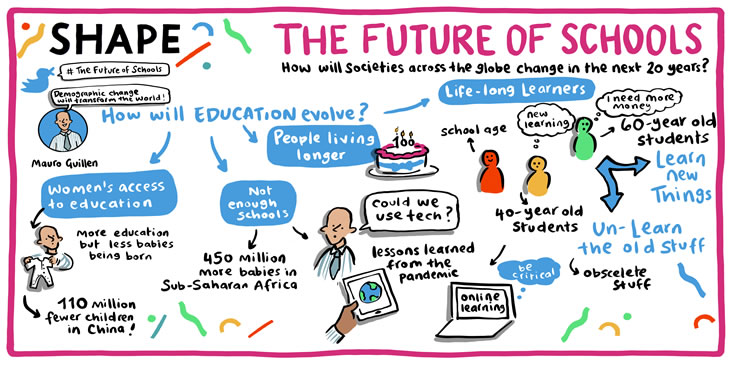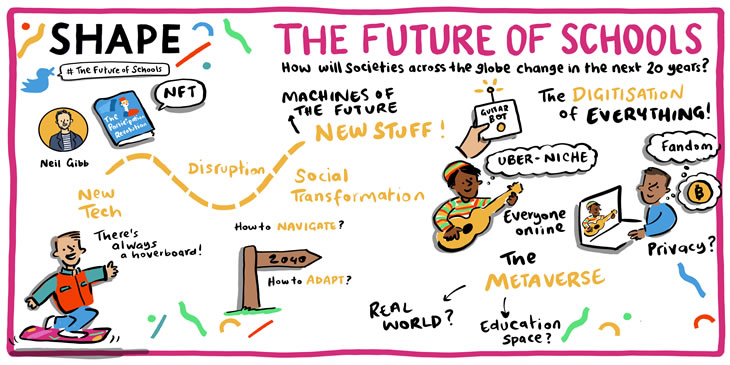In this five-part blog series, we explore the themes discussed at our recent SHAPE Education event titled 'The Future of Schools'. In this blog, we focus on the first day of the five-day event which aimed to unpack social issues facing the future of education, demonstrate the complexity of the issues in global and local contexts, and identify ways that we might respond to the emerging challenges.
Education is undertaken around the world, yet the factors shaping it vary considerably by country. Largely guided by technological, economic, ecological, and social shifts, our role as educators is to actively respond to change in order to best serve and support learners, and to enable them to face future challenges. To do this, we need to ask ourselves: What does the future of education look like in different contexts? What are the challenges we’re facing? And crucially, how do we actively contribute to the evolution of education?
These questions were central to the SHAPE Education: Future of Schools event that ran from the 12—16 July. The first day of the event aimed to unpack social issues facing the future of education, demonstrate the complexity of the issues in global and local contexts, and identify ways that we might respond to the emerging challenges. Our day one contributors were Mauro F. Guillén, Neil Gibb, Glen Leadbetter, and Teocah Dove.
What did Mauro and Neil talk about in their lightening talks?

Mauro’s talk could be epitomised by one of his closing remarks – “demographic changes are so big that they’re going to transform the educational landscape over the next 5 to 10 years”. With rising populations in sub-Saharan Africa and ageing populations across the globe, he emphasised that education will need to evolve differently in different parts of the world. In sub-Saharan Africa, for example, he noted that over the next 10 years, around 450 million babies will be born. These children will need access to school and education and it is very likely that students will “attend” school online, creating opportunities for digital pedagogies.
He also believes future learners will be more diverse. With longer life spans, and fast-paced changes in industry, Mauro suggested that financial needs and career changes are likely to encourage people in their 40s, 50s, and 60s to unlearn obsolete practices and engage in life-long learning, most likely online. He closed by calling for a critical change in education, saying that “education in the future will need to help people learn and also help people unlearn”. Many questions came to mind during this talk, spanning the cost of education, the role of bite-sized learning, and access and equity in education, showing how widespread these notions are in contemporary education. Watch Mauro’s talk to find out more.

Neil’s talk also pointed to challenges associated with accelerated changes, as learners are increasingly having to learn to adapt to new ways of thinking and working, and develop resilience alongside wellbeing. Unlike Mauro, Neil focussed on the present and built his talk around William Gibson’s notion that “The future is already here – it’s just not very evenly distributed”. Neil discussed how the role of technology and digitisation is becoming normalised in some societies with “the digitisation of everything”. While this brings many benefits, a key challenge is the sustained and growing commodification of knowledge and education, which can contribute to its uneven distribution. Overall, Neil’s talk provided a tour of emergent opportunities and challenges in education, including gamification and digital pedagogies and it emphasised the importance of centring on the learner to achieve our future educational goals. Stating that “as technology becomes automated, it’s going to be the heart, the arts that become more important.”, Neil asked: “How do we build relationships? How do we solve problems in communities? How do we collaborate together?”
Keeping the discussion going
Responding to both Mauro and Neil, Glen said that while advances in technology can bring advantages to education, we need to develop critical thinking and literacies in our learners by “teaching everybody to look at information and judge it for what it is” to help them navigate boundless information on the web. For educators, he also reflected on Mauro’s idea of unlearning stating that we need to foster creativity and new ways of working in teachers as well as students. That being said, he also pointed to challenges we’re facing. For example, at policy and institutional levels, he argued that stakeholders need to embrace shifts in education for them to be successful. Teocah echoed the importance of working with stakeholders and policy, stating that globally, not all countries are equally equipped to foster educational change and that “countries in the global south would look to the global north for support via development aid”. She reflected on the impact of climate change, lack of energy and technology, and ever-growing poverty on education in the global south. She also raised important questions of whose future education we’re envisaging when we think about educational goals. A key theme emerging from the discussions was how we can address issues of inequality in education.
If you’ve not yet watched their talks, you can check out the links to the recordings above and the fireside chat and watch out for our next blog on what education will look like in 20 years.
SHAPE Education is an initiative supported by Cambridge University Press & Assessment and Cambridge Judge Business School.